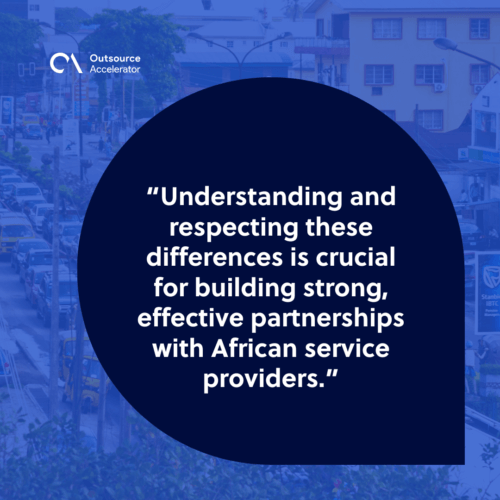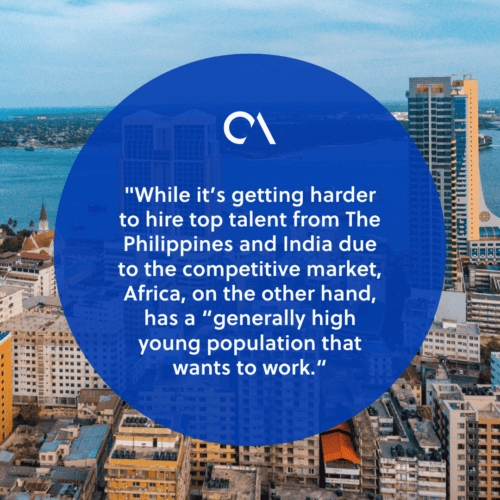Why you should outsource to Africa

Outsourcing has become a strategic move for many businesses aiming to reduce costs, access specialized skills, and increase operational efficiency.
While traditional outsourcing destinations like India and the Philippines remain popular, Africa is rapidly emerging as a viable alternative.
In the 496th episode of the Outsource Accelerator Podcast, CRDLE Founder and CEO Valerie Bowden shared her thoughts on African outsourcing, its social impact, and the challenges that come when businesses outsource to Africa.
Key reasons to outsource to Africa
Outsourcing to Africa offers numerous benefits that make it an attractive option for businesses worldwide.
Below are some key reasons why companies are choosing to outsource to Africa:
1. High retention rate
Africa boasts a young, dynamic, and increasingly well-educated workforce.
Many African countries have made significant investments in education, producing a pool of highly skilled professionals ready to meet global demand.
While it’s getting harder to hire top talent from The Philippines and India due to the competitive market, Africa, on the other hand, has a “generally high young population that wants to work.”
Valerie noted, “In here, there are so many people who want jobs. And when they are working for a US company, it’s the pinnacle, right? They’re so excited to finally get into a US company that the retention rate is really, really high.”
The CRDLE CEO added, “Another reason why there’s a good ROI from hiring from the African continent is because when you get someone, train them, and put them into a good system, they’re not going to leave you.
They’re going to stay with you and do a really great job.”
2. Cost-effectiveness
Due to the lower cost of living, outsourcing to Africa offers competitive labor costs. These are often lower than those in more established outsourcing markets.
This cost advantage allows businesses to maintain high-quality services while significantly reducing operational expenses.
3. Stability and government incentives
Like other continents, Africa faces conflicts. However, these conflicts “don’t impact the other countries.”
Anecdotally, Valerie shared, “If something happened in Sudan, it had no bearing on Ethiopia. But I would say usually the capital cities where most of our team members are located are really safe and secure.”
She added, “Even recently, Ethiopia had some conflict [but] we had no issues. There was no internet down. There are no power problems. So I think most African countries are actually quite stable. And even when there is conflict, it doesn’t reach the capital city as much…
At the end of the day, the governments want to see people working, especially young people, so there’s a lot of incentives to keep things stable.”
4. Time zone compatibility
Africa’s geographical location offers a unique advantage for businesses in Europe and the Middle East. The time zone overlap allows for real-time collaboration and quicker turnaround times, enhancing productivity and efficiency.
In addition, African staff “really don’t mind the 9-5 EST shift.” Valerie noted that this schedule “is actually quite doable and preferred on their end.”
African outsourcing challenges
While the advantages of outsourcing to Africa are compelling, it’s essential to consider the challenges associated with this decision.
Being aware of potential obstacles can help businesses prepare and strategize effectively. Here are some key challenges to keep in mind:
1. The misconceptions
Many businesses are unaware of Africa’s diverse and dynamic markets. Misconceptions can prevent companies from recognizing the potential and opportunities available in different African countries, leading to missed business opportunities.
Traveling to Africa will allow you to see the different countries’ varying strengths and skill sets.
Valerie shared, “When we want people with really good accents for cold calling, usually Ethiopia or Zimbabwe are some of our top favorites.
If you want really good virtual assistants who probably have a little bit more experience, [they’re] a little bit easier to find in places like Kenya or Uganda…
We’re getting a lot of people from Gambia reaching out. So it’s super exciting and we’re excited to hire more from other places on the continent as well.”
2. Cultural differences
Cultural differences can impact communication and business practices. Understanding and respecting these differences is crucial for building strong, effective partnerships with African service providers.

3. Regulatory environment
Navigating the regulatory landscape can be complex. Different countries have varying legal and regulatory requirements, and businesses must ensure compliance to avoid potential legal issues.
Outsourcing to Africa presents a compelling opportunity for businesses looking to reduce costs, access a skilled workforce, and leverage a growing tech ecosystem.
While there are challenges to consider, the potential benefits far outweigh the risks for companies willing to invest in understanding and navigating the African outsourcing landscape.
With the right outsourcing partner like CRDLE, Africa can become a valuable outsourcing destination for your business.








 Independent
Independent




